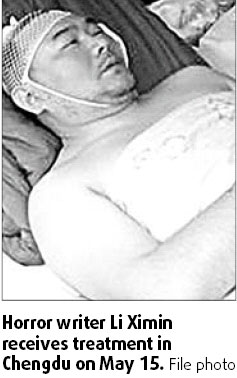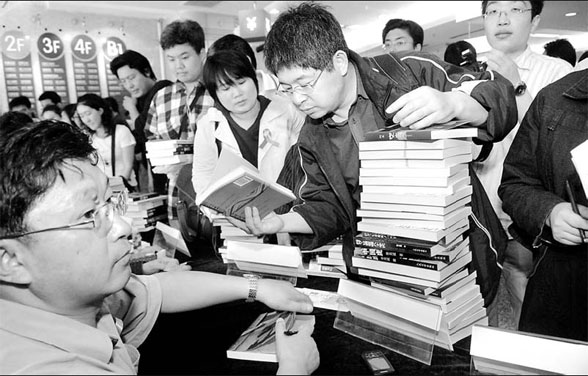True horror
By Raymond Zhou (China Daily)
Updated: 2008-05-21 07:08
Updated: 2008-05-21 07:08
|
Famous Chinese writers, including Sichuan-native A Lai (left), take part in a fundraising event in Beijing Book Store, on May 18, for the earthquake victims. File photo |
"I'm breathing hard, as if there is a big rock on my chest. I cannot see anything, but hear only a chilly voice whispering into my ear: 'Li Ximin, you're dead.' How can I be dead? I have a clear sense I'm alive - my mind works quickly, only my body cannot move, as if it is bound and gagged. Who's joking with me?
The voice vanishes.
I see a pale light in front of me. I want to climb out of my bed, but I can't move my body.
Suddenly, I hear howling as my room teems up with people. Among them are my parents, my wife, my child, my brother, my friends and some indistinct faces. They're all crying. Some are saying, 'It's no use crying over a dead person. You should take care of yourself. '
'Who is dead?' I shout. But, nobody answers me.
Darkness engulfs me as I hear the sound of nails being hammered into the coffin. I can move my body now, but my struggle is in vain. Nobody knows I'm alive. My relatives and friends are still crying.
In that single moment, desperation wells up inside me. I have a feeling I am being buried alive."
The above excerpt was posted on Li Ximin's blog on April 29. At the time, the writer of horror stories never imagined he would two weeks later be living out a scenario far more frightening than his self-induced fiction.
Li was buried alive for more than three days - 76 hours - in last week's earthquake in Sichuan.
It was truly a nightmare that rivals any of his previous works.
He managed to survive. And, he lives to tell his story.
At the request of a friend, Li took a trip to a mountainous resort in northwestern Sichuan's Dragon Gate town, of Pengzhou city, roughly a dozen miles from the epicenter.
The fresh air and beautiful scenery was something the Fujian-born and Shanghai-based writer felt was needed to fire up his imagination for a new novel. After spending five days in town, Li had written 30,000 words by May 12.
Li was diligently working away on his manuscript when things started swaying and falling off the shelves in his room. He quickly ducked under a bookcase.
The building collapsed and he was trapped underneath the fallen shelf and a pile of rubble. His neck and left hand were completely stuck. Only his right hand could move, but it could not reach anything.
"I couldn't even drink my own urine, if I wanted," Li said.
Coincidentally, his notebook computer with wireless Internet capability had fallen right in front of him. He thought of seeking help through the Internet.
The connection was lost, but fortunately, Li had mistaken the quake for just a landslide.
"Had I known it was an earthquake of such magnitude, I would have figured out that help could not easily reach this isolated place - and I might have given up hope," said Li.
Amid the aftershocks, which sent rocks rolling down hills, Li could see a ray of light through the cracks of debris.
To preserve energy, he would shout for help every three hours. His right hand was bruised and bloody. He said he purposely harmed it so the pain would prevent him from dozing off.
By May 14, many people across the country had learned of his fate.
The website Sina began mobilizing a rescue campaign.
Li had no idea best-selling author Han Han was among those rushing to Sichuan to look for him. Postings of sympathy were plastered all over the Internet.
Eventually, a signal from Li's cell phone was detected.
The signal was so weak, his phone was unable to receive or transmit calls or text messages. But, the information was passed on to a local radio station that was able to notify rescue teams in the area.
In the end, it was a Chengdu-based air force team that finally rescued Li.
Eerily enough, Li had served in the PLA air force for 21 years. It was where he first took up writing.
Arduous journey to safety

Li was staying on the fourth floor of the resort. The place, set in a quiet locale, was not widely familiar, as it was a new business that had not yet officially opened.
The building, situated on a cliff-side, was completely crushed and seriously shifted by the quake.
Li's room was left dangling in the air. One more aftershock could have rocketed the resort dozens of meters down the canyon below.
The first person who heard Li's cry for help was a staff member at the resort. He did not have enough strength to remove all the rubble, so he trekked for a day - over landslides to seek help from Li's friend, who had invited him to the one-man writing camp.
Li's friend, Yi Yanduan, and another volunteer walked another day to reach Li. When they arrived, the two of them used hammers to begin chipping away at the rubble. They worked through the night, but there was little success.
Yi went to search for more help and met a unit of air force soldiers. The soldiers were very brave and very efficient.
At the risk of tumbling over the precipice, they climbed atop the rubble and started digging.
Li cooperated by telling them where he was. They cracked through two ceilings. But, every time they broke the cement rubble, grit and gravel would fall onto Li. The weight of the debris crushed down on him, making it hard to breathe.
"My throat was full of phlegm. I had to cough constantly. My phlegm was turning thicker and thicker," Li recalled.
At one point, the soldiers even had to climb into the hole they had cracked to remove more debris before they could get to Li.
Three non-stop hours of grueling work later, Li was extracted from the rubble at 6:30 pm on Thursday. Shortly after Li was moved to safety, the rubble collapsed entirely.
The soldiers put Li on a stretcher and walked several more hours before reaching a helicopter. Li was then flown to Chengdu, where he was treated for injuries.
Afterthought

Once described by Guangzhou-based magazine Southern People Weekly as "the king of horror and a pioneer in China's new concept" - the fiction writer is known for his "hot temper, kind heart, bravery and an imagination rich in lurid details".
But, Li says his recent brush with death has since mellowed him out tremendously.
"I wrote many horror stories. I thought the plots I contrived were scary, but this real-life incident turned out to be the scariest of all," he says.
But the 41-year-old says several reasons pushed him not to give up hope of survival.
"My daughter is only one year old. She cannot lose her father. My wife and all my loved ones need me. My new book is not finished yet. How could I give up so easily?"
Lying on a hospital bed, Li pauses to think about the past days' events. Li says he is thankful to all the friends who reached out to help him, especially the air force soldiers who took great risks to remove him from the fragile building.
As a way to give back, Li is compiling a collection of pieces written about the military. The series will be called Return in Warmth and Thankfulness. Li will donate all proceeds to the relief efforts of the Sichuan earthquake.
(China Daily 05/21/2008 page16)
|
||
|
||
|
|
|
|
